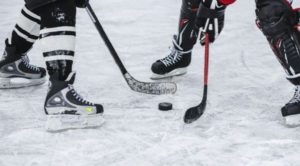 As Richard Shimooka writes in the Vancouver Sun, when it comes to toxic cultures in military or hockey, “leadership has been conspicuously absent from this entire debacle.”
As Richard Shimooka writes in the Vancouver Sun, when it comes to toxic cultures in military or hockey, “leadership has been conspicuously absent from this entire debacle.”
By Richard Shimooka, November 26, 2021
November marks the 11th anniversary of the passing of Donna Winslow. While hardly a household name, Winslow was known as Canada’s preeminent military cultural anthropologist, and passed away far too early at the age of 56. In 1996, she wrote a groundbreaking work on the culture of the Canadian Airborne Regiment, which were involved in the atrocities in Somalia.
Her work has great resonance today in light of the Canadian Armed Forces sexual misconduct crisis, as well as the heinous acts committed by Australian Special Air Service members in Afghanistan. In the latter case, a special investigation by the inspector-general recommended criminal investigations into 23 incidents that took place in Afghanistan.
At the heart of her analysis, Winslow focused on group identities, and how “hyper investment” in them helps develop high-performance groups. However, in certain circumstances, this can lead to serious moral and ethical lapses — although these were often justified as a necessary evils to ensure the organization was able to operate in these unique situations.
But Winslow’s observations have relevance to events much closer to home, such as the recent revelations surrounding the Chicago Blackhawks’ handling of sexual assault allegations by player Kyle Beach against coach Brad Aldrich. While conflating military atrocities with the cover-up of sexual misconduct allegations in a sports team may seem like a stretch, consider the similarities in the organizations from which they spring.
Both are high-performance organizations that are intended to operate in pressure-filled environments, whether it be combat or the Stanley Cup playoffs. Many sports teams actively seek to emulate the military — some teams even use U.S. Navy SEAL induction methods for team-building. Furthermore, NHL culture tends to de-personalize players and enforces conformity among individuals, placing the team’s well-being above everything else.
Other examples include the recent claim by Vegas Knights goalie Robin Lehner, who has called out teams for allegedly providing drugs for sleep without prescriptions, or the resignation of Anaheim Ducks general manager Bob Murray following allegations that he created a toxic work environment. They are cases of the winning-at-all-cost mentality. This is not purely driven by internal considerations. Hockey fans expect and praise the commitment and sacrifice players make in their quest for victory, further reinforcing this culture.
Many players will do everything they can to be a part of that group, and then protect their place in it.
The real issue is how groups deal with the fallout. It is clear that both the Canadian Armed Forces and the Chicago Blackhawks front office sought to mitigate the potential damage of disclosures by suppressing them, at least initially. Several individuals who were present at senior meetings suggested head coach Joel Quenneville and team president John McDonough prioritized protecting the team and avoiding any disruptions during its quest for the Stanley Cup. That is entirely consistent with how these groups are designed to operate.
So how can these issues be corrected and such situations prevented from happening in the future?
It is not as easy as saying we need to de-emphasize group identities. There are many reasons why having a strong group identity is beneficial, in hockey and in war. High levels of trust and understanding are essential between soldiers and between players to ensure their group operates effectively. They also can provide a positive environment for building individual self-esteem and dealing with these challenges.
Rather, as Winslow pointed out, what is essential is strong leadership, professionalism and ethos within these groups to ensure they adhere to societal norms.
Leadership has been conspicuously absent from this entire debacle — even among some players. One of the most disturbing allegations was that teammates taunted Beach about the alleged assault. The agents of change must emerge at all levels, and not be persecuted for their candour.
The NHL’s creation of a code of conduct last year in the aftermath of systemic racism allegations, as players like Akim Aliu and Robin Lehner spoke out about their experiences, is a first step. But this will take years, if not decades to resolve. Successfully shepherding that change requires intelligence and insight, as Winslow identified a decade ago.
Richard Shimooka is a senior fellow at the Macdonald-Laurier Institute.





